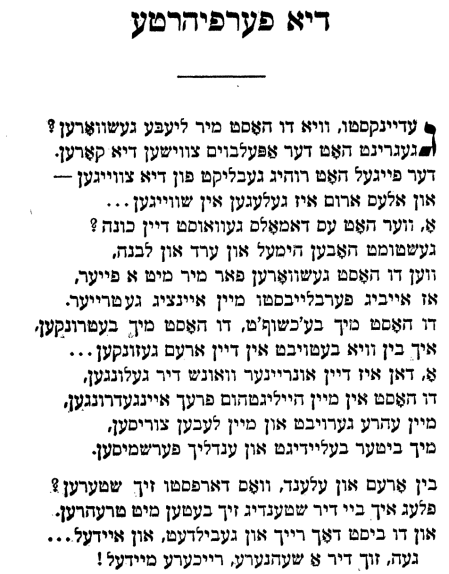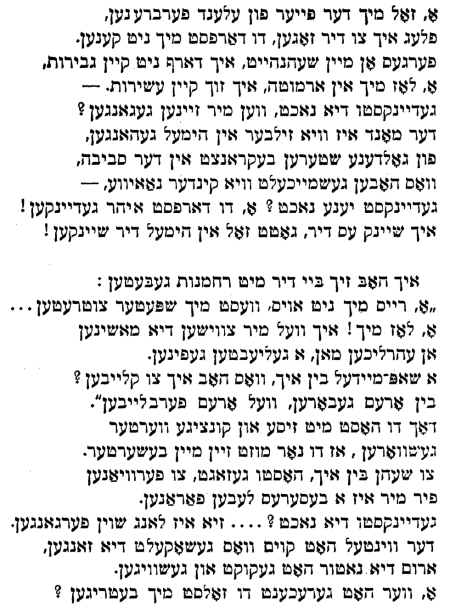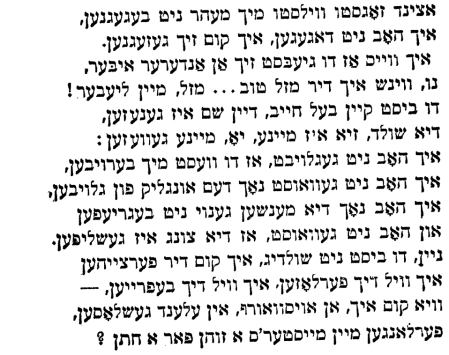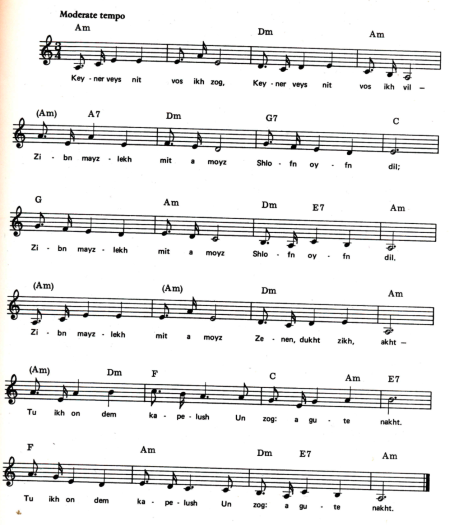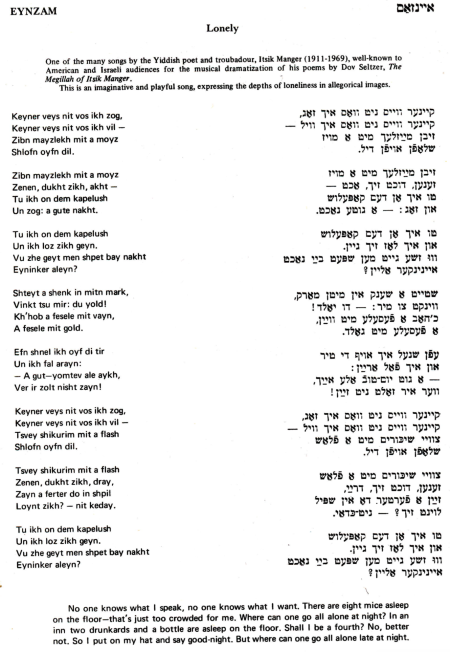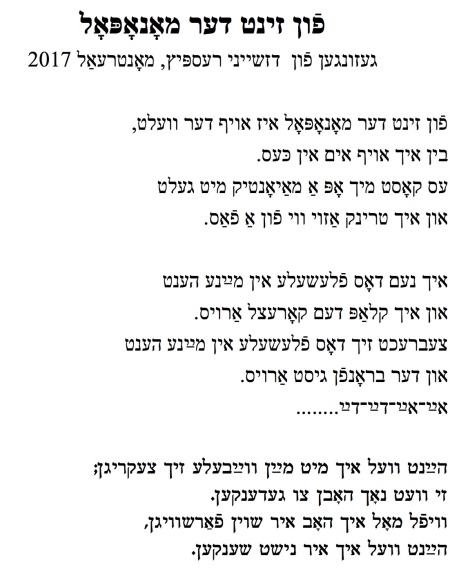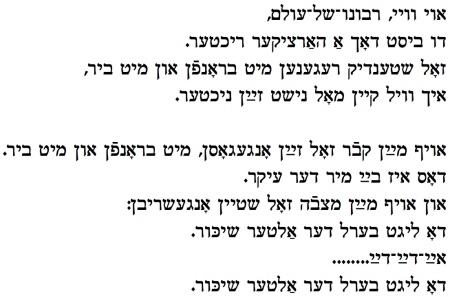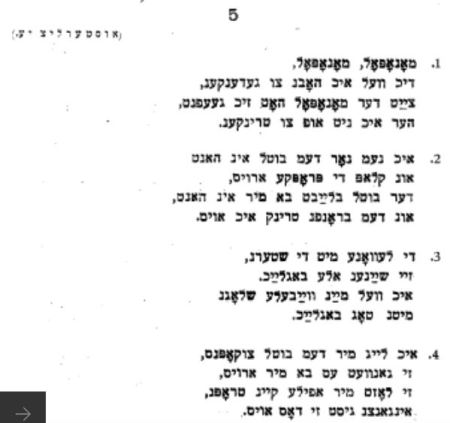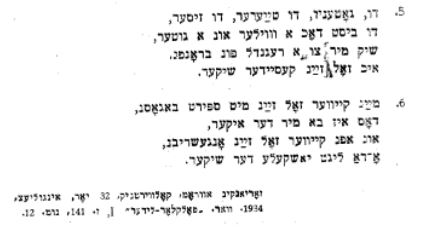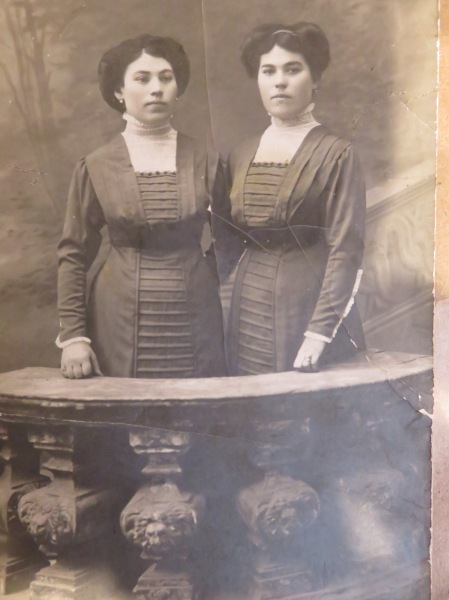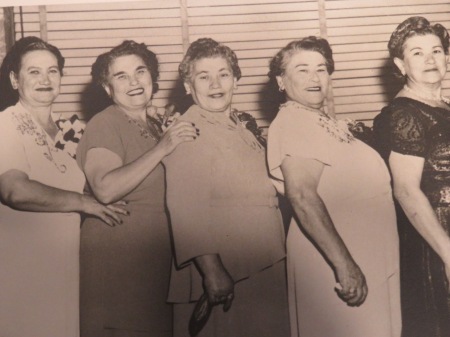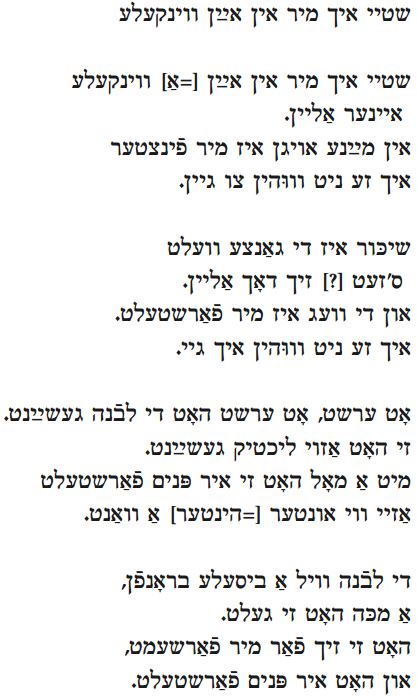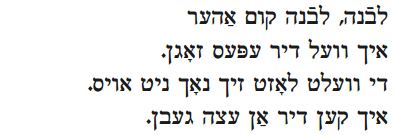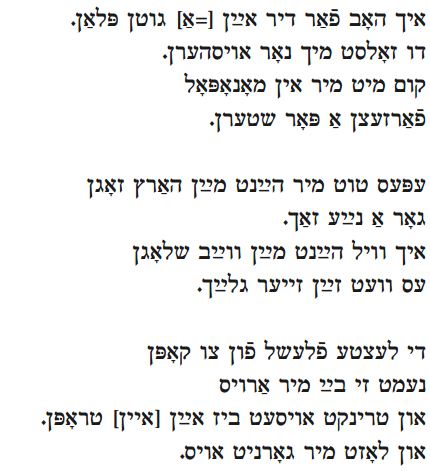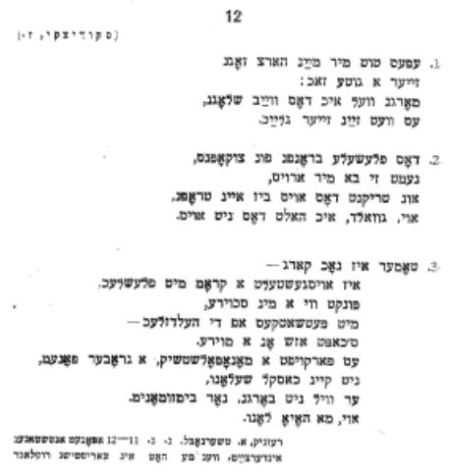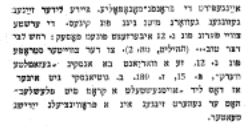Di farfirte / The Woman Who was Led Astray
Words and (music?) by Morris Rosenfeld
Sung and recorded by Leo Summergrad
Commentary by Itzik Gottesman
This poem appears in the first volume of Morris Rosenfeld’s (1862 – 1923) poetry. Leo Summergrad learned it from his mother and I have only found one reference to the song: a query in Chana and Yosl Mlotek’s Forverts column “Leyner dermonen zikh lider”. But the two compilers had never heard of the song.
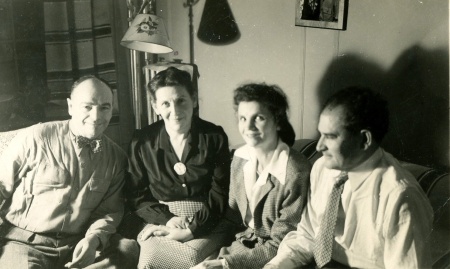 Leo Summergrad’s mother, Minnie, and father, Abram Summergrad, on the right side. His in-laws Moishe and Esther Korduner are on the left.
Leo Summergrad’s mother, Minnie, and father, Abram Summergrad, on the right side. His in-laws Moishe and Esther Korduner are on the left.
Rosenfeld’s original poem is composed of three 14-line stanzas and we have printed it this way, though in Summerfeld’s handwritten transcription, which we attached, he has divided it into the more common 4 line stanzas. We are also attaching the printed version from Volume I of Rosenfeld’s collected works.
Though we are not sure who composed the music, we do know that Rosenfeld composed melodies to his poetry and sang them at readings.
Thanks to Leo Summergrad for contributing this recording.
1
Gedenkstu vi du host mir libe geshvorn,
gegrint hot der eplboym tsvishn di korn.
Der foygl hot ruik geblikt fun di tsvaygn
un ales arum iz gelegn in shvaygn.
O, ver hot es damolst gevust dayn kavone.
Geshtumt hobn himl un erd un levone.
Ven du host geshvorn far mir mit a fayer,
az eybik farblaybstu mayn eyntsik getrayer.
Du hot mikh farkisheft, du host mikh batrunken.
Ikh bin vi batoybt in dayn orems gezunken.
O, dan iz dayn umreyner vuntsh dir gelungen.
Du host in mayn heyliktum frekh ayngedrungen.
Mayn ere geroybt un mayn lebn tserisn.
Mikh biter baleydikt un endlikh farshmisn.
Do you remember, you swore your love for me.
The apple tree was greening among the rye.
The bird calmly watched us from the branches
and everything around us lay in silence.
O, who could then have known your intention.
Silent were heaven and earth and the moon,
when you swore to me with a fire,
that eternally you would remain my one true one.
You cast a spell on me; you intoxicated me.
I was as if deaf when i lay in your arms.
O, then you succeeded with your filthy desire;
into my sacred shrine you insolently penetrated.
You robbed me of my honor and tore my life apart.
Insulted me bitterly and finally whipped me.
2
Bin orm un elnt vos darfstu zikh shtern?
Fleg ikh bay dir shtendik zikh betn mit trern.
Un du bist dokh raykh un gebildet un eydl.
Gey zukh dir a shenere, raykhere meydl.
O, zol mir der fayer fun elnt farbrenen,
fleg ikh tsu dir zogn du darfst mikh nit kenen.
Farges on mayn sheynkeyt, ikh darf nit keyn gvires.
O loz mikh in armut, ikh zukh keyn ashires.
Gedenkstu di nakht ven mir zaynen gegangen
der mond iz vi zilber in himl gehangen.
Fun goldene shtern bakranst undzer svive
vos hobn geshmeykhlt vi kinder nayive.
Gedenkstu yene nakht? O, du darfst ir gedenken.
Ikh shenk es dir, Got zol in himl dir shenken.
I am poor and alone, why bother yourself.
I had always with tears pleaded with you.
Yet you are wealthy, educated and gentle.
Go find yourself a prettier, richer girl.
O, let the fire of loneliness burn me up,
I used to say to you, you should not know me.
Forget about my beauty; I need no valor.
Leave me poor, I do not search for riches.
Do you remember the night when we walked;
the moon was like silver hanging in the sky.
Golden stars crowned our surroundings
and smiled like naive children.
Do you remember that night? O, you should remember it.
I give it to you as a gift; God should give you it as a gift in heaven.
3
Ikh hob zikh bay dir mit rakhmones gebetn.
O, rays mikh nit oys vest mikh shpeter tsetretn.
O, loz mikh! ikh vel mir tsvishn di mashinen
an erlekhn man, a gelibtn gefinen.
A shapmeydl bin ikh, vos hob ikh tsu klaybn.
Bin orem geborn, vel orem farblaybn.
Dokh, du host mit zise un kuntsike verter
geshvorn az du nor muzst zayn mayn basherter.
Tsu sheyn bin ikh, hostu gezogt, tsu farvyanen
far mir iz a beseres lebn faranen.
Gedenkstu di nakht tsi iz lang shoyn fargangen
der vint hot koym vos geshoklt di zangen.
Arum di natur hot gekukt un geshvign
o, ver hot gerekhnt du zolst mikh batribn.
With compassion I pleaded with you.
O, don’t tear me out; stomp on me later.
O, leave me, so that among the machines
I will find an honest man, a lover.
I’m a shopgirl, what is my choice –
I am poor and will remain poor.
Still, with sweet and artful words
you swore that you must be my destined one.
Too beautiful am I, you said, to every wilt.
For me there is a better life awaiting.
Do you remember the night or is it far in the past?
The wind barely moved the stalks.
The nature around watched and was silent.
O who would have thought you would sadden me so.
4
Atsind zogstu vilstu mikh mer nit bagegenen
ikh hob derkegn, ikh kum zikh gezegenen.
Ikh veys az du gist zikh an anderer iber.
Nu, vintsh ikh dir, mazel-tov, mazl mayn liber.
Du bist keyn bal-khayim, dayn shem iz genezn
Di shuld zi iz mayne, yo, mayne gevezn.
Ikh hob nit gegloybt az du vest mikh baroybn
Ikh hob nit gevust nokh dem umglik fun gloybn.
Ikh hob nokh di mentshn genoy nit bagrifn.
Ikh hob nit gevust az di tsung iz geshifn.
Neyn, du bist nit shuldik; Ikh kum dir fartsayen
Ikh vil dikh farlozn, ikh vil dikh bafrayen.
Vi kum ikh, an oysvorf, in elnt geshlosn
farlangen mayn maysters a zun far a khosn?
Now you say you no longer want to see me.
I, to the contrary, come to bid farewell.
I know that you now love another:
so I wish you good luck and good fortune my love.
You are a living creature, your name will recover.
Guilty am I, yes I was the guilty one.
I did not believe that you would rob me.
I did not know of the tragedy in believing.
I did not know that the tongue is sharpened.
No, you are not guilty; I come to ask your pardon.
I want to leave you; I want to liberate you.
How could I, an outcast, trapped in loneliness,
ask my boss’s son to be my groom?
